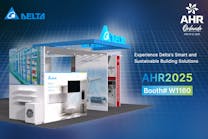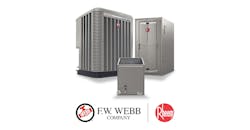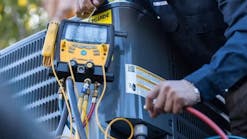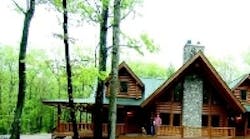The Leydens' dog, Ben, enjoys relaxing in the comfort of the fireplace.
The Leydens' traditional log home is set in the foothills of the Berkshires in Southwick, MA.
Jim Patterson enjoys focusing on specialty designs, like in the Leydens' log home.
The equipment installed by Orchard Valley provides three zones on the first floor and three zones on the second.
Ed and Patti Leyden enjoy the comfort of their new log home, and are grateful that Jim Patterson was able to come in and clean up after their first contractor.
When Ed and Patti Leyden started building their log home in Southwick, they knew that they wanted radiant heating. They just didn't know too about it. They hired a contractor to and install the system, but Ed and weren't satisfied.
"I came to realize quickly that the work was substandard, so we ended up firing him," Ed says.
They also realized that they'd have to find someone who has proven, quality workmanship and can provide what they wanted. Who better to turn to in "the valley" than five-time Quality Home Comfort Award winner, Jim Patterson and Orchard Valley Heating and Cooling?
"Jim came highly recommended from some of the local plumbing houses" Ed says, "Jim came in and did an evaluation and submitted a proposal that went above and beyond what we were looking for, and we've been extremely impressed with the system."
"I looked at what they'd had installed, and verified that it was pretty bad," Jim adds.
What happened to the Leydens, unfortunately, is sometimes typical with new construction jobs — the magical low number wins, no matter what kind of equipment is being installed, and the contractor starts doing work that isn't quite up to par. Fortunately, the Leydens were able to catch it in time, and then find Orchard Valley.
"Once this other contractor started putting in ductwork and piping the boiler, the Leydens realized that the quality and the workmanship and the type of materials they were getting were substandard," Jim says. "I went through a redesign with them, using new components.
"I always use the same equipment — Trane, Buderus, Viega — so it was very easy for me to show them the equipment on some of my other jobs. They'd seen the old technology — the single-stage fans, the archaic boiler, and the control system that was half thought out."
Jim then showed Ed and Patti all of the new technology available in HVAC —variable speed fans, multiple zones of air, multiple zones of radiant, and smart control systems — and they were very impressed.
"After seeing the worst of the worst, then seeing-what I had to offer, they understood where they needed to be for this house," Jim says. "We ripped out almost everything that was installed by the previous contractor and started over."
CHANGE OF PLANS
With a log home, Ed and Patti suspected that a typical forced hot air system wouldn't work, and that was why they wanted radiant heat.
"We were dead-set against (forced hot air) initially, because it creates hot and cold spots in the log home, and we didn't want that," Ed says. "But, I'm extremely impressed with the system Jim installed, the fact that the forced hot air doesn't have any of the typical hot and cold spots surprised me."
Jim used a Trane TWE 049 variable speed air handler with the integrated zone system to make sure the Leyden's home didn't have any of the problem spots they were worried about. For the hydronic system, Jim used a Buderus oil-fired boiler, a Buderus logomatic energy management system, and a Buderus radiant mixing station.
"Variable speed air is something I spend a lot of time educating homeowners about because everyone wants cooling in their house," Jim says. "Everybody wants good air quality and humidification, but if you don't blend those components with the radiant properly you'll gets these parts that don't really work well together.
"However, I wouldn't even attempt to put in the zoning without the Trane variable speed air handler with their integrated zone system. It is, by far, one of the most versatile on the market."
The first floor features three zones of staple-up radiant heating and three zones of variable speed hydro-air, while the second floor features three zones of hydro-air to condition the upper loft and two guest suites.
BREATHING EASY
While showing the Leydens all of the new technology available in HVAC, Jim didn't pass up the opportunity to talk about indoor air quality.
"Once I showed them what the features and benefits were, it became a big impact on what they wanted," Jim says. "They have a HEPA filter in place now and an ultra-violet light air purification system."
Jim installed a 5-in. pleated Trane media filter, a Sanuvox 3500 ultra-violet air purifier, and a Fantech HEPA filtration system. In addition, he went with a general Resdelux steam humidification system to keep the log home from drying out.
"Given the nature of the wood structure in the log house, maintaining the humidity level in the house in the wintertime is critical," Jim says.
Originally, Jim included the steam humidification system in his plans and explained the benefits to Ed and Patti. The Leydens decided against it, but after a short time, they quickly changed their minds when they began to see the effects of not having one.
"He educated me a lot (on IAQ) and we were open to that. As he explained it to me, I could appreciate the advantages to this type of system," Ed says. "He educated me on the UV lighting and the HEPA design, and he answered questions about air quality, and dust, and things of that nature that log homes, in particular, often have trouble when using a forced hot air system."
MAKING IT WORK
Coming up with the system is one thing, but finding a way to make it fit is another. As with most new homes, ductwork is an afterthought — one that creates quite a challenge for an HVAC contractor.
"Nobody ever plans on ductwork when buildinga new home," Jim says. "A lot of guys, with a multi-story house, will put an air handler in the basement, and another one in the attic with no need for chase-ways between floors.
"My way is different; if I can condition a house with 5-tons or less, I really push to do a single air-handler in the basement."
When Jim came in, he learned that the previous contractor hadn't planned on providing cooling to the upper floor. It was originally just going to be baseboard hot water on the second floor and just an air conditioner for the first floor, so the challenge for Jim was to find chase-ways to get to the second floor.
"There was nowhere to run ductwork," Jim says. "The way we zoned it, we have five zones of conditioned air. When you zone to that level, you have to oversize your ducting to accommodate the airflow.
"But we were able to make it fit and it doesn't stick out. We even did custom grille work to match the hickory floors and the cedar ceilings. We did what we could to make everything blend in."
THE END RESULT
"Initially I thought that with all the different types of systems going on, that the house would be very complicated for me," Ed says. "But it isn't. It basically runs itself, and Jim says I shouldn't have to mess with it. He did educate me a lot."
The Leydens are happy with their new comfort system, and are glad Jim was able to come in a fix the other contractor's mistakes while educating them at the same time.
"You have to look long term as far as your investment goes," Ed says. "We paid a lot of upfront costs, but I think the value is certainly there. You can't be short-sighted when it comes to heating and cooling."
|
EQUIPMENT LIST Hydronic System:
Air System:
|









